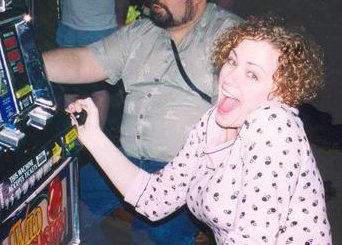For Terry
Terry- the coolest collar-popper I know! This one's for you...
The debate about collars is especially fierce among the college crowd. There are a lot of passionate college paper editorials weighing in on the look, and even a number of university groups dedicated to hating upturned collars. I can't remember exactly what I debated in college, but I like to think it was of more consequence than collar positioning. Save the fluff for adulthood. And this animosity from college students doesn't make sense: If anyone can get away with turned-up collars, they can. It's one of those things that are far easier to pull off during college than afterward—like smoking, bisexuality, and a messiah complex.
Its meanings aren't simple. The look can signal conservative or gay, modern gentry or deconstruction worker. Or nothing. It frames the face in a way that is flattering but essentially vampiric. The look isn't confined to one demographic; it seems to be as prevalent in Chinatown and pizza parlors as it is in Madison Square Park or the No. 6 train as it moves through the Upper East Side.
Not everyone is doing it. Not even a majority. Maybe one in 15. But this is enough to affect the scene. When this many collars are up, it changes the meaning of the collars that are down, because then they're not only down but they're decidedly not up. As when there is silence in a place used to chaos, like a stadium, that silence is charged—it's a reaction, whether it wants to be or not.
The debate about collars is especially fierce among the college crowd. There are a lot of passionate college paper editorials weighing in on the look, and even a number of university groups dedicated to hating upturned collars. I can't remember exactly what I debated in college, but I like to think it was of more consequence than collar positioning. Save the fluff for adulthood. And this animosity from college students doesn't make sense: If anyone can get away with turned-up collars, they can. It's one of those things that are far easier to pull off during college than afterward—like smoking, bisexuality, and a messiah complex.
Its meanings aren't simple. The look can signal conservative or gay, modern gentry or deconstruction worker. Or nothing. It frames the face in a way that is flattering but essentially vampiric. The look isn't confined to one demographic; it seems to be as prevalent in Chinatown and pizza parlors as it is in Madison Square Park or the No. 6 train as it moves through the Upper East Side.
Not everyone is doing it. Not even a majority. Maybe one in 15. But this is enough to affect the scene. When this many collars are up, it changes the meaning of the collars that are down, because then they're not only down but they're decidedly not up. As when there is silence in a place used to chaos, like a stadium, that silence is charged—it's a reaction, whether it wants to be or not.


4 Comments:
This comment has been removed by a blog administrator.
By Michael G Bare, at 7:23 AM
Michael G Bare, at 7:23 AM
This comment has been removed by a blog administrator.
By Michael G Bare, at 7:28 AM
Michael G Bare, at 7:28 AM
From a visual/cultural theorist perspective: The popped collar made its heaviest impact in the early 80's, and during that time became a social signifier for the yuppie crowd (from here on to be referenced as yuppie-core). So it became an economic sign, the signifier begin that of class. The recent 80's fashion backlash, a kind of masturbatory aesthetic fetishization places the popped collar in the same stream of conciousness as the "mod's" in London in the 60's and early 70's: the use of an economic signifier (power suit for the "mods," or in this case popped collar) for fetishistic purposes, where form supercedes and makes a mockery of the content, thereby destabilizing the power/economic to aesthetic dynamic.
or maybe people think it "looks cool."
By Michael G Bare, at 7:28 AM
Michael G Bare, at 7:28 AM
who in the world wrote this little diatribe?
By Robert, at 7:33 AM
Robert, at 7:33 AM
Post a Comment
<< Home